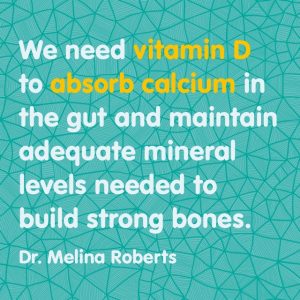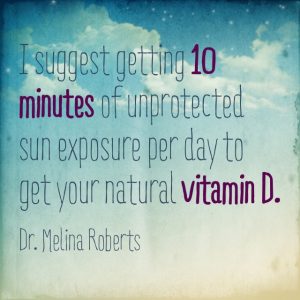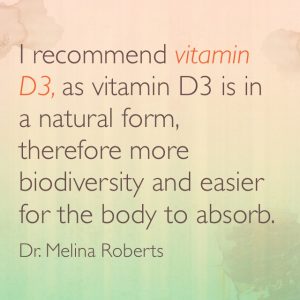We live is a society that fears the sun. We hear medical advice saying that sun exposure leads to skin cancer. This has led to a many people wearing sunscreen when they are outdoors, covering up when they are outside in the sun or avoiding going in the sunlight altogether.
Let’s expose the truth on this topic and really understand the facts.
Overexposure to the sun leading to repeated sunburns does put us at risk of skin cancer, but if we are not getting enough sunlight to manufacture Vitamin D in the skin, low vitamin D levels are associated with many health conditions including heart disease, cancer, osteoporosis, depression, dementia, and leaky gut syndrome. The UVB rays in sunlight interact with cholesterol in the skin and convert it to vitamin D in the body.
Perhaps the advice to completely avoid the sun (and deplete your vitamin D stores) may be putting you at more risk than the sun itself.
Here are FIVE Important Functions of Vitamin D in the Body:
- We need vitamin D to absorb calcium in the gut and maintain adequate mineral levels needed to build strong bones.
- We need vitamin D to maintain adequate serum calcium and phosphate concentrations for proper muscle contraction, for appropriate nerve conduction and general cellular function.
- Vitamin D has immune-modulating properties that is needed for normal immune function.
- Vitamin D is a potent neuroregulatory steroidal hormone that is made from cholesterol, which is the main building block of your hormones, and if there is not adequate amounts of vitamin D, this can disrupt proper hormone balance.
- Vitamin D3 increases the biodiversity of the microbiome and decrease opportunistic pathogens in the gut.
I suggest getting 10 minutes of unprotected sun exposure per day to get your natural vitamin D, this is the best way to get your vitamin D. If you are unable to get natural vitamin D through sun exposure, then I recommend supplementing with Vitamin D. If you are supplementing with vitamin D, you need to understand that vitamin D is a fat-soluble vitamin, therefore in order for it to be absorbed, it needs to be taken with other fats. In terms of vitamin D taken orally, I recommend vitamin D3, as vitamin D3 is in a natural form, therefore more bioavailable and easier for the body to absorb. I recommend that adults take 1000 IUs of Vitamin D daily, if they are not getting adequate sun exposure. You can also obtain some vitamin D from food sources including fatty fish such as tuna, salmon and mackerel as well as egg yolks.
By understanding the important role that Vitamin D plays in our body, we can ensure that our body is getting enough vitamin D through sun exposure, supplements or food sources.




